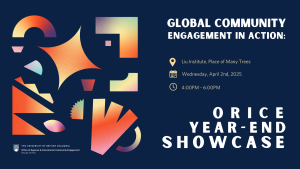About the Presenters
GEEP groups
Wealth Development and Well-being: Assessing the Impact of AFRIpads’ Rural Employment Initiative Engagementship
This project focuses on assessing the direct impacts of employment at AFRIpads, a social enterprise where 80% of the workforce is women. AFRIpads seeks to understand how its decisions—such as locating its factory in a rural area, prioritizing female employment, and providing healthcare and pension benefits—affect individuals and households. Running from October 2024 to April 2025, this engagementship involves refining research questions, reviewing past studies, designing research methodologies, and developing data collection tools for a future study. The project critically examines the intersections of economic growth and social development, incorporating African scholarship and methodologies. Building on a 2023 survey analyzing economic changes around AFRIpads’ factory, this research further explores the broader social and economic impacts of their work.
AFRIpads aims to provide women and girls with a sustainable solution for managing their periods with comfort and dignity. Their mission is to empower through business, innovation, and opportunity to move closer to gender equality.
Inclusion Policy & Mechanism Analysis in Kenya with Basic Needs Basic Rights Engagementship
This project focuses on a desk research initiative analyzing Kenya’s inclusion policies, particularly those related to disability and mental health, to assess implementation mechanisms, monitoring, and public data availability. The findings will provide critical context for Basic Needs Basic Rights (BNBR) as they refine their organizational priorities, develop policy briefs, and guide future research. Running from October to December 2024, this engagementship involves environmental scans, literature reviews, and policy analysis, culminating in a comprehensive report on policy effectiveness and alignment with BNBR’s mission.
BNBR is a leading Kenyan NGO dedicated to mental health and development, integrating psychosocial support, community empowerment, and policy advocacy. As part of its five-year strategic plan, BNBR is prioritizing research-driven initiatives, continuing its partnership with ORICE to enhance evidence-based decision-making and advocacy efforts.
Community Mental Health Nursing: Evaluation & Policy Impact with Kamili Organisation Engagementship
Kamili Organisation seeks to evaluate the impact of its specialized mental health training for nurses, examining the facilitators, barriers, and effects of implementing their knowledge at their home sites. This one-term engagementship (January–April 2025) involves refining evaluation questions, reviewing program materials, conducting literature and policy scans, and developing data collection tools for a future study.
Kamili has trained 156 nurses across 44 of Kenya’s 47 counties, equipping them with community-based mental health care skills to improve accessibility and affordability. The organization operates over 30 clinics, providing diagnosis, treatment, psychosocial support, and community education to reduce mental health stigma.
Scholars in Prison Engagementship
This co-curricular project is a collaboration between the UBC Human Rights Collective (HRC) and the global Scholars at Risk (SAR) Network, supporting SAR’s Scholars in Prison Project. Over two semesters, students are engaging in human rights research and advocacy for imprisoned scholars in Iran and Belarus. In the first semester, they analyzed political, legal, and social contexts, tracked advocacy efforts, and established media monitoring protocols. In the second semester, they are implementing informed advocacy strategies in consultation with SAR and HRC, with past efforts including government petitions, awareness events, and policy submissions. Throughout the project, students will critically engage with issues of power, positionality, and human rights discourse. In late March, students will travel to Washington, DC for SAR’s US Student Advocacy Days 2025, an immersive opportunity to engage with other students, faculty, and a community of activists working to promote and protect academic freedom and the human rights of wrongfully imprisoned scholars.
Scholars at Risk (SAR) is an international network dedicated to protecting scholars and promoting academic freedom through advisory services, advocacy, and monitoring of threats to higher education. Their Practitioners-at-Risk program provides temporary academic positions for scholars facing grave threats, allowing them to continue their work until conditions improve.
